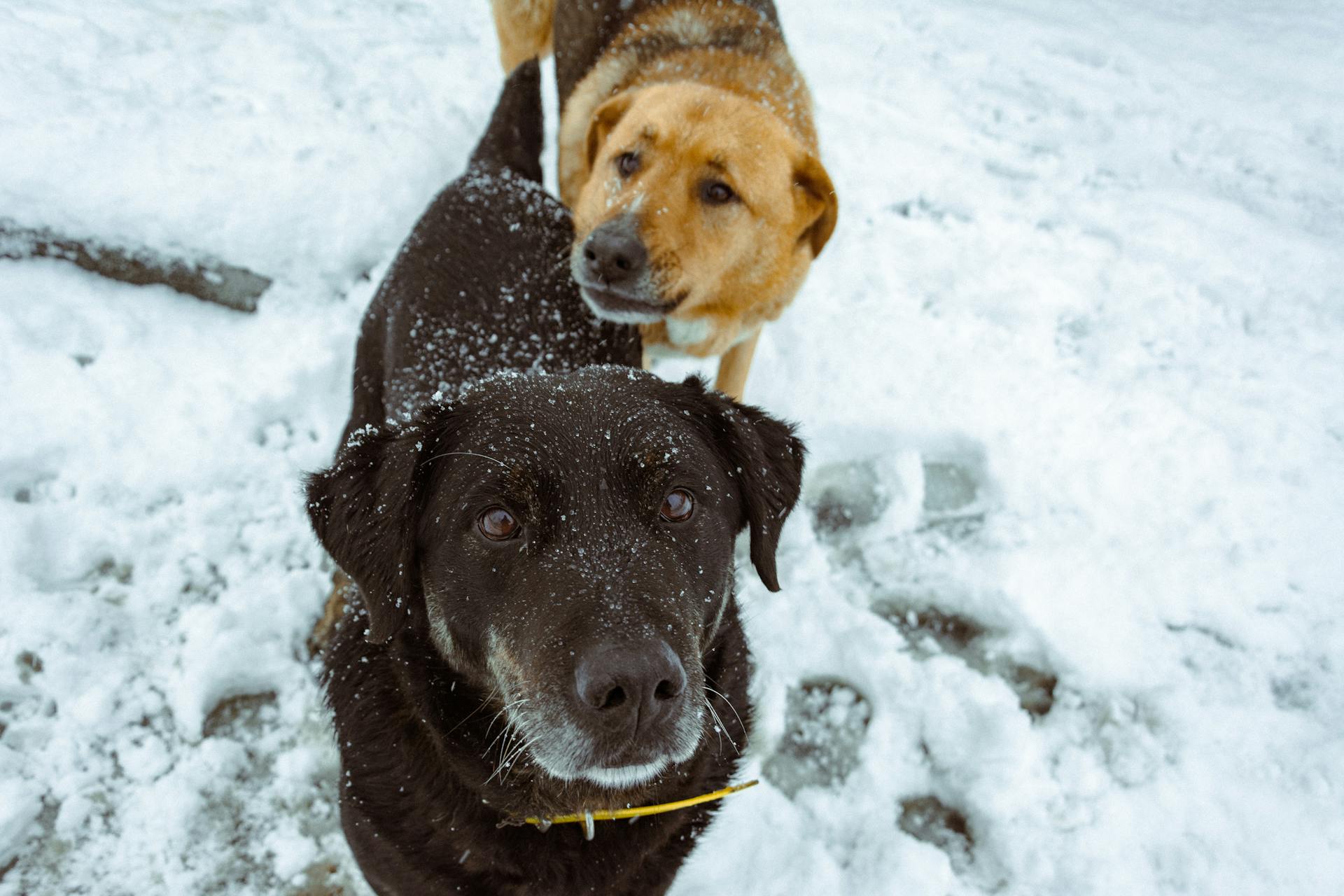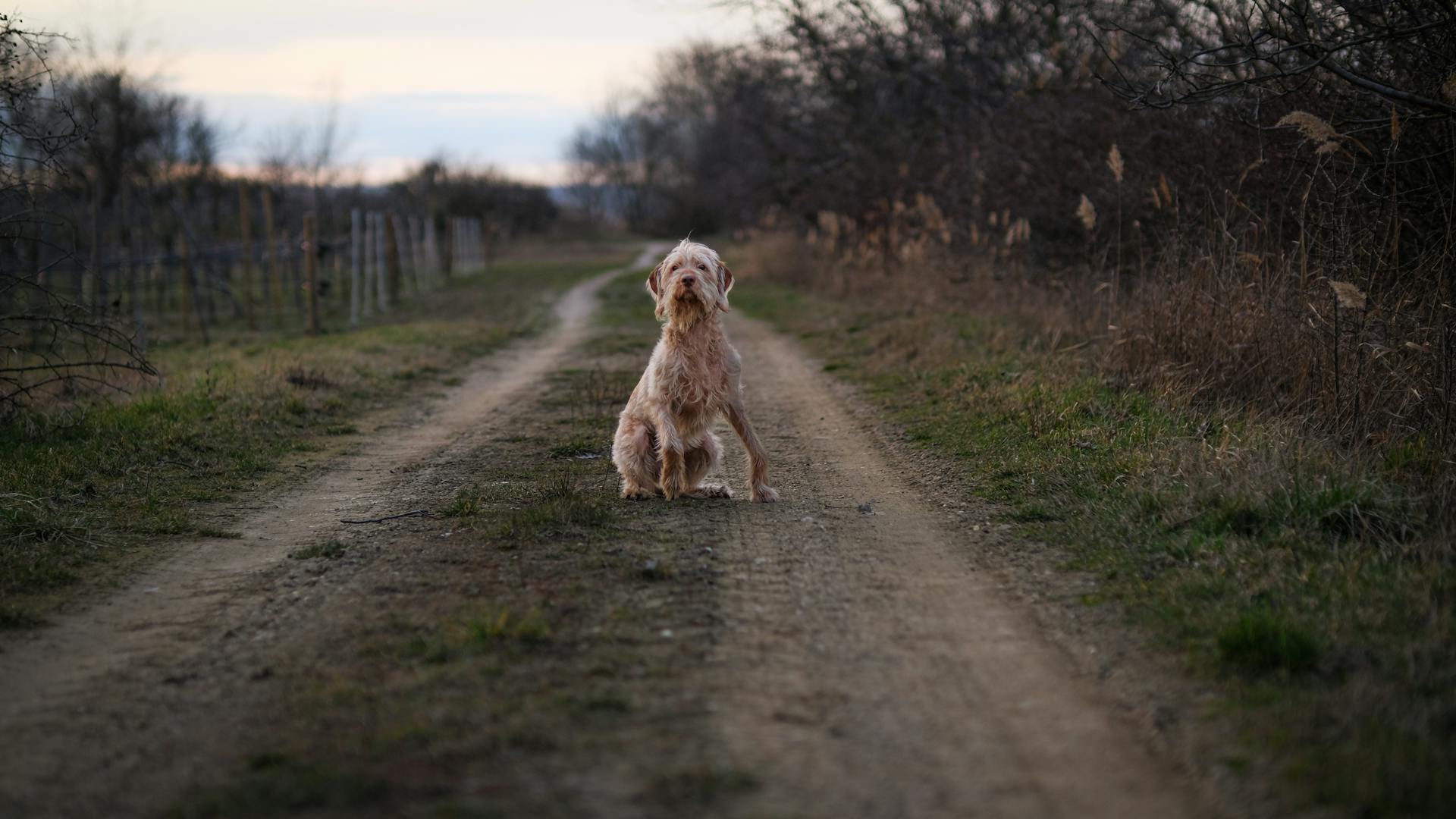
Kennel cough is a highly contagious respiratory infection that affects dogs of all ages. It's caused by a combination of viruses and bacteria, including the Bordetella bronchiseptica bacteria.
Symptoms of kennel cough can vary from mild to severe, but common signs include a persistent cough, runny nose, and lethargy. In severe cases, dogs may develop a high fever, difficulty breathing, and a hacking cough that can last for several weeks.
The isolation period for kennel cough is typically 14 to 21 days, depending on the severity of the symptoms and the individual dog's health. This allows the dog to recover and prevent the spread of the infection to other dogs.
During this time, it's essential to provide your dog with plenty of rest, hydration, and a balanced diet to aid in their recovery.
If this caught your attention, see: Dog Upper Respiratory Infection vs Kennel Cough
Symptoms and Diagnosis
Kennel cough symptoms can start showing up two to three days after exposure, but it can take up to 10 days or even four weeks if the dog has canine distemper.
The classic symptom of kennel cough is a persistent dry hacking cough, often described as sounding like a goose honk.
Dogs may also exhibit reduced appetite if they have a fever, or show other symptoms like sneezing, a runny nose, or discharge from their eyes.
A cough that sounds like a "goose honk" is the most prominent clinical sign of kennel cough, and it may be followed by retching and gagging.
This cough can be easily induced by gently palpating the larynx or trachea.
Veterinarians usually rely on visible signs of disease, specifically the characteristic hacking or gagging cough, to diagnose kennel cough.
In some cases, veterinarians may conduct laboratory tests, including bacterial culture, to aid in the diagnosis.
A positive response to antibiotics is also an indication of Bordetella infection, which is the underlying cause of kennel cough.
A different take: Kennel Cough Gagging
Causes and Contagiousness
Several pathogens can cause upper respiratory tract infections in dogs, including viruses like canine distemper virus and canine influenza, and bacteria like Bordetella and Streptococcus equi subspecies zooepidemicus.
Any dog exposed to one of these pathogens can be infected, but repeated exposure in a moist, warm environment with poor ventilation significantly increases the risk of infection.
A kennel or shelter is a perfect breeding ground for the spread of infectious coughs, which can spread quickly and easily among dogs, often requiring a whole section to be quarantined.
For another approach, see: How Fast Does Kennel Cough Spread
Causes of Upper Respiratory Infections in Dogs
Upper respiratory infections in dogs can be caused by a variety of pathogens, including Bordetella, parainfluenza, and canine distemper virus. These pathogens can be found in kennels and shelters, where the environment is often moist and warm with poor ventilation.
Any dog exposed to one of these pathogens can be infected, but repeated exposure increases the risk. Dogs in kennels or shelters are more likely to be infected due to the environment.
Bordetella, parainfluenza, and Streptococcus equi subspecies zooepidemicus are bacteria that can cause upper respiratory infections in dogs. The others, such as canine distemper virus, are viruses.
Dogs can be infected simply by being exposed to an infected dog at a dog park or other public place. The infection can spread quickly and easily in these environments.
For your interest: Bordetella Vaccine vs Kennel Cough
How Long Is Contagious?
Kennel cough is a highly contagious illness that can be spread through direct contact with an infected dog, as well as through contaminated surfaces.
The contagious period for kennel cough can last for several weeks or even months, depending on the specific pathogen causing the infection.
Dogs can be contagious for up to 14 days after symptoms have resolved, although some may continue to spread the illness for several weeks or even months.
Repeated exposure to a moist, warm environment with poor ventilation, such as in a kennel or shelter, can increase the likelihood of infection.
The contagious period may be shortened by several days when antibiotics are prescribed for kennel cough, especially for bacterial forms of the illness.
Good cleaning and hygiene are essential in preventing the spread of kennel cough, including spraying surfaces with a disinfectant for 5-10 minutes to kill the pathogen.
It's generally considered safe to board your dog 7 days after symptoms have completely disappeared, but it's best to contact the boarding facility directly to discuss their specific policies and protocols.
Explore further: Is Pancreatitis in Dogs Contagious
Treatment and Vaccines
Most cases of Kennel Cough will resolve without treatment, but sometimes anti-inflammatories, antibiotics, and/or certain cough suppressants are given to speed recovery and minimize symptoms.
Always check with a Vet and never self-medicate using human drugs.
Keeping your dog away from other dogs for around two weeks is advised, although this can vary depending on the severity of the infection.
Dogs generally recover completely within three weeks, although recovery can be longer in older dogs, puppies, or sick patients.
Ongoing Kennel Cough can occasionally lead to chest infections or pneumonia, so if symptoms worsen or don't resolve, take your dog back to see the Vet.
Intranasal or intraoral kennel cough vaccinations are the quickest to provide protection, often achieving immunity within just 3 days after administration.
Treatment
Most cases of Kennel Cough will resolve without treatment, but sometimes medication is given to speed recovery and minimize symptoms.
Anti-inflammatories, antibiotics, and cough suppressants may be prescribed by a vet to help manage symptoms.
Curious to learn more? Check out: How to Treat Kennel Cough in Humans

Please always check with a vet before giving your dog any medication, and never self-medicate with human drugs.
Keeping your dog away from other dogs for around two weeks can help prevent the spread of the infection.
This isolation period may vary depending on the severity of the infection, so it's essential to follow your vet's advice.
Dogs usually recover completely within three weeks, although it can take longer for older dogs, puppies, or those with underlying health issues.
Ongoing Kennel Cough can occasionally lead to chest infections or pneumonia, so monitor your dog's symptoms closely and return to the vet if they worsen or don't improve.
For your interest: Female Dog Yeast Infection Symptoms
Vaccines
Vaccines are a crucial part of preventing kennel cough. Intranasal or intraoral kennel cough vaccinations are the quickest to provide protection, often achieving immunity within just 3 days after administration.
Injectable kennel cough vaccinations take longer to achieve protection, requiring an initial booster dose. Immunity with the injectable vaccines is around 7-10 days, following the booster dose 2-4 weeks after the first dose.
The type of vaccine you choose will depend on your dog's individual needs and health status.
Recommended read: Healthy Mind Canine - Separation Anxiety Training
Recovery and Boarding
If your pup contracts Kennel Cough, it's essential to wait at least one week from the time they start treatment before returning to daycare, assuming they're on the expected course of recovery and no longer exhibiting symptoms.
The cleaners used in daycare facilities, like Pawsitive Pooch, are specifically formulated to target and eliminate potential transmission of viruses and bacteria like Kennel Cough.
If you notice coughing while your dog is in care, the facility will isolate them until you can pick them up, and they'll notify you immediately.
Dogs are considered safe for boarding 7 days after their symptoms, such as coughing, have completely disappeared, but this is just a guideline, and different facilities will have their own policies.
Some dogs may continue to spread the illness for several weeks or even months, depending on the specific pathogen causing the kennel cough.
It's best to contact the boarding facility directly and discuss the appropriate return date for your dog, especially if they have had kennel cough.
If the boarding facility has very good disinfection, cleaning, and hygiene protocols in place, your dog will be more likely to have a safe and healthy boarding experience.
Frequently Asked Questions
Can I take my dog on a walk with kennel cough?
It's not recommended to walk your dog with kennel cough, especially if symptoms are severe or the dog is still contagious. Consult a veterinarian for guidance on safely managing your dog's condition.
Sources
- https://www.merckvetmanual.com/respiratory-system/respiratory-diseases-of-small-animals/kennel-cough
- https://resources.bestfriends.org/article/kennel-cough-dogs-symptoms-treatments-vaccine
- https://www.caldervets.co.uk/news/facts-about-kennel-cough/
- https://www.pawsitive-pooch.com/kennel-cough-facts
- https://www.kingsdale.com/how-long-is-kennel-cough-contagious-in-dogs
Featured Images: pexels.com


